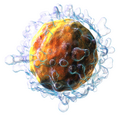T cell: Difference between revisions
CSV import |
CSV import |
||
| Line 36: | Line 36: | ||
[[Category:Human cells]] | [[Category:Human cells]] | ||
{{Immunology-stub}} | {{Immunology-stub}} | ||
== T cell == | |||
<gallery> | |||
File:Blausen_0625_Lymphocyte_T_cell_(crop).png|Lymphocyte T cell | |||
File:Red_White_Blood_cells.jpg|Red White Blood cells | |||
File:CD4+_T_cell_subsets.pdf|CD4+ T cell subsets | |||
File:Killer_T_cells_surround_a_cancer_cell.png|Killer T cells surround a cancer cell | |||
File:T_cell_activation.svg|T cell activation | |||
File:HIV-infected_T_cell_(6813384933).jpg|HIV-infected T cell | |||
</gallery> | |||
Latest revision as of 21:03, 23 February 2025
T cell
A T cell or T lymphocyte is a type of lymphocyte (a subtype of white blood cell) that plays a central role in cell-mediated immunity. T cells can be distinguished from other lymphocytes, such as B cells and natural killer cells, by the presence of a T-cell receptor on the cell surface. They are called T cells because they mature in the thymus from thymocytes (hence T cell).
Types of T cells[edit]
There are several different types of T cells, each with a unique function:
- Helper T cells (Th cells) – they assist other white blood cells in immunologic processes, including maturation of B cells into plasma cells and memory B cells, and activation of cytotoxic T cells and macrophages.
- Cytotoxic T cells (Tc cells, CTLs) – they destroy virus-infected cells and tumor cells, and are also implicated in transplant rejection.
- Memory T cells – they remember antigens they have encountered in the past, allowing for a faster response to subsequent encounters.
- Regulatory T cells (Tregs) – they maintain tolerance to self-antigens and prevent autoimmune disease.
- Natural killer T cells (NKT cells) – they share characteristics of both T cells and natural killer cells.
T cell activation[edit]
T cells are activated when they are presented with peptide antigens by MHC class II molecules, which are expressed on the surface of antigen-presenting cells (APCs). Once activated, they divide rapidly and secrete small proteins called cytokines that regulate or assist in the active immune response.
Role in disease[edit]
T cells play a key role in the immune response to many diseases, including viral infections such as HIV and autoimmune diseases like rheumatoid arthritis and type 1 diabetes. They are also a critical component of the immune response to cancer, and are a target for many new cancer therapies.
See also[edit]

This article is a immunology stub. You can help WikiMD by expanding it!
T cell[edit]
-
Lymphocyte T cell
-
Red White Blood cells
-
CD4+ T cell subsets
-
Killer T cells surround a cancer cell
-
T cell activation
-
HIV-infected T cell




